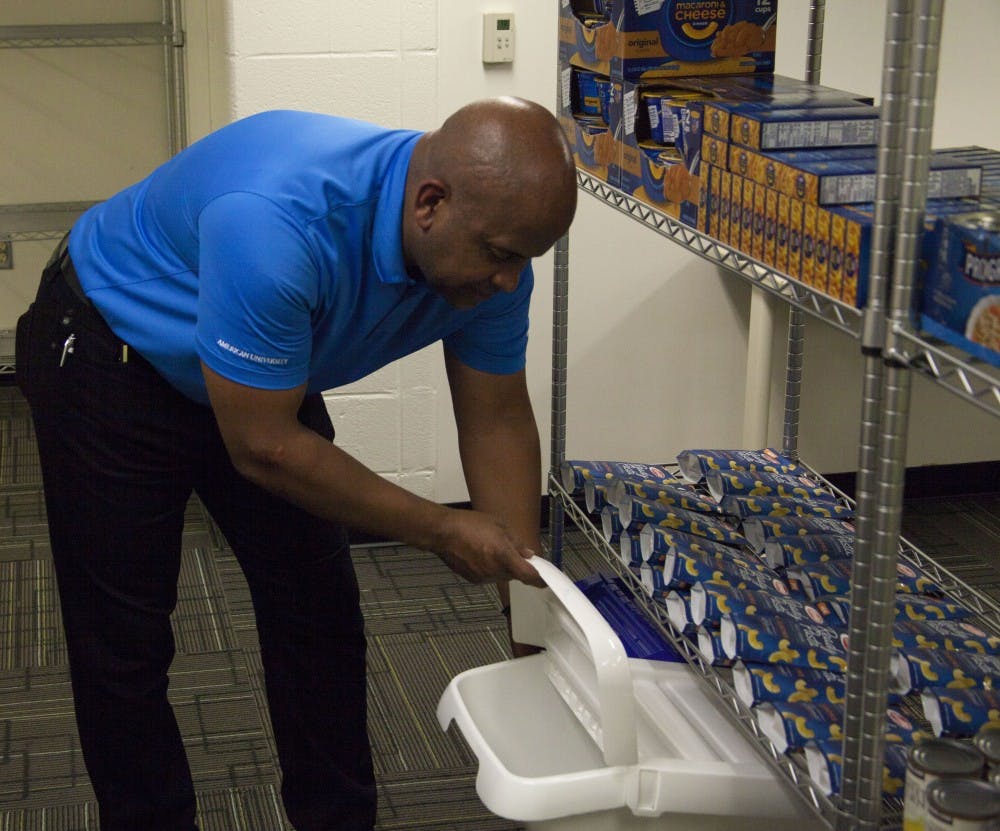Macaroni and cheese, cereal and canned goods.
These are all items you’ll find in AU’s new student-run food pantry, The Market, which opened its doors Sept. 5. The pantry’s goal is to combat student hunger and increase food security across campus.
While the pantry is not yet fully operational, students in need can make requests for access to it and pick up what they need, Dr. Fanta Aw, the University’s vice president of campus life, told The Eagle in July. There will not be a limit on how much a student may receive from the pantry, she said.
“The purpose of the food pantry is to provide food access to students who may be challenged in getting proper nutrition and the right amount of food because they are concerned about cost issues,” Aw said.
For privacy reasons, students will be able to access the pantry alone and receive what they need, Aw said. The pantry is located in room 2 on the lower level of Letts Hall. Students chose this location because it is easily accessible to students and an ideal place to load and store food items, Aw said. The pantry is open between 6 a.m. to 12 p.m. and 2 p.m. to 2 a.m. daily.
Students will be able to request access to the pantry through a form and be able to enter the space using their AU One Card. Two work study students will be hired to manage inventory and oversee the operations of the pantry. There may be opportunities for volunteers to organize donations, Aw said.
“We may have some students who decide to do research on food security that can help us,” Aw said.
The pantry will be supplied with purchases from the DC Food Bank and replenished according to the types of food the students need the most, Aw said. The pantry is a partnership with the Capital Area Food Bank and the Center for Community Engagement and Service and is a member of College and University Food Bank Alliance. As the project moves forward, the pantry may look into the option of accepting donations from other groups depending on the need for other items.
“This will be built over a period of time,” Aw said. “It will be starting with food first and then build the other aspect of it by getting feedback from students. Initially, we are starting with food and then we’ll be doing an inventory of what the other needs are and replenish it as needed.”
AU alumna Emily Dalgo identified a need for the pantry in 2016, after she collected 700 responses from her survey on food insecurity. 44 percent of the students who responded said they did not have enough food for themselves at some point. Another 59 percent said they were aware of a student who did not have enough food.
“People just don’t realize others are going through food insecurity because there’s a huge stigma and silence around money,” Dalgo told The Eagle in 2016. “A lot of AU students are very wealthy and very lucky to come from families that can support them and I know that they do appreciate it often, but it also comes with the downside of not seeing other people don’t have that.”
Tony Hollinger, the director of student engagement and diversity initiatives in the Office of Campus Life, believes that this issue is one that affects students greatly.
“The food pantry is one of the most important projects I’ve ever worked on because it is focused on helping students in an area of need that impacts their daily well-being, their academic performance and again, their overall health,” Hollinger said. “I’m glad that AU has an active food pantry here on campus to support those students.”
Aw said that the pantry serves purposes beyond addressing students’ immediate food needs.
“Our focus is certainly to make sure that those who are in need are getting their needs met first, but on a campus like ours, there is a real opportunity to have a collaborative and a coordinated effort around a range of things particularly related to food security,” Aw said.
Different offices on campus tried to address food security independently in the past after recognizing this need, Aw said. She believes that The Market is a more systematic way to help students and hopes that this will give students much easier access.
“We are going to be listening carefully to what the needs are as people begin to use it so we can make sure that it is responsive to the needs and we want to have a more comprehensive approach to food security,” Aw said.





